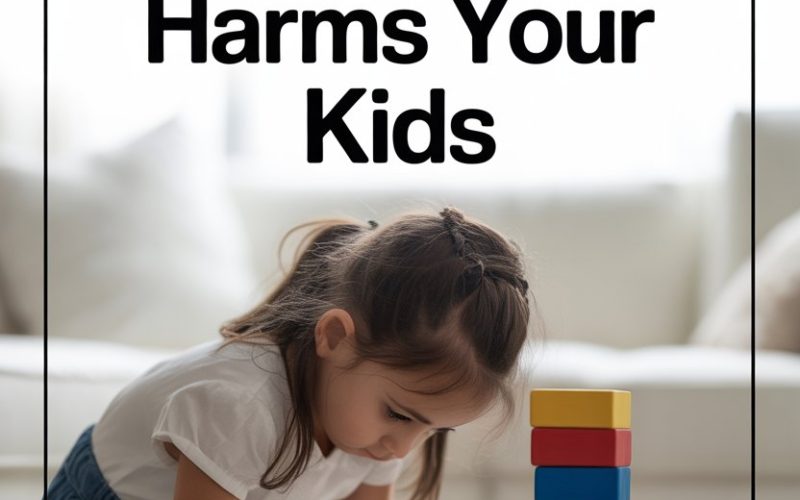If only kids came with a manual and a pre-installed “Self-Esteem Booster,” parenting would be a delight.
But here we are: muddling through, loving hard, and—sometimes accidentally—passing down our own Type-A tendencies.
If perfectionism has ever made you redo a birthday cake at midnight or cringe at a less-than-stellar art project, you’re not alone.
But what’s the real fallout when perfectionism trickles down to our kids? Turns out, it’s not just about straight lines and spotless jumpers.
Let’s get real about how perfectionism can mess with your child’s happiness, resilience, and even their willingness to try new things—and what you can do about it, starting tonight.
1. Perfectionism Teaches Kids to Fear Mistakes
Picture this: Your kid is learning to ride a bike. After a wobbly start and a spectacular fall, they look at you.
What they see on your face—pride, panic, or judgment—matters more than you think.
Kids raised under the shadow of perfectionism often develop an acute fear of making mistakes.
If you wince every time their spelling is off, or quietly tidy up their Lego masterpiece, they learn that errors equal failure. And failure? Well, that’s to be avoided at all costs.
According to American Psychological Association, children of parents with high perfectionist tendencies are more likely to experience anxiety and avoidance behaviors.
Instead of seeing mistakes as chances to grow, they see them as evidence they aren’t good enough.
Here’s where it gets sneakier. Fear of mistakes doesn’t just make them double-check their sums; it can make them opt out altogether.
Why bother trying out for footy if not making the team would mean they’re “not good enough”? Why start a new instrument if they’re not the next Mozart by Tuesday?
The antidote: Try normalizing mistakes. Celebrate effort (however wobbly).
If your child brings home spelling with a rogue “Q,” resist the urge to whip out the red pen. Ask them what they enjoyed about the assignment.
Share your own flops—bonus points if they’re funny. The goal isn’t to lower standards, but to show your child that being imperfect is part of being gloriously, hilariously human.
2. Perfectionism Stifles Creativity and Initiative
Ever watched a child freeze before drawing a single line, terrified the picture won’t be “right”? Or a teen stare at a blank screen, unable to start their essay because it’s not Shakespeare-level prose in draft one?
Perfectionism can choke off creativity before it even starts.
Children who believe only flawless work counts will often avoid projects where they can’t guarantee success. That means fewer experiments, less imagination, and—let’s be honest—a lot less fun.
Psychologist Dr. Brené Brown puts it succinctly: “Perfectionism is the twenty-ton shield that we lug around, thinking it will protect us, when in fact, it’s the thing that’s really preventing us from being seen.”
Kids who fear judgment won’t take risks. No risks, no wild ideas, no breathtaking creativity.
Creativity thrives when there’s room for mess and missteps. In fact, Frontiers For Young Minds suggests that making mistakes actually helps the brain grow.
If perfectionism is running the show, your child is robbed of these valuable learning opportunities.
Ready to loosen the reins? Try setting up “failure challenges” at home.
Who can build the tallest tower before it falls over? Who can make the silliest poem, even if it doesn’t rhyme? Applaud risk-taking, not just polished results.
Give your child permission to draft, doodle, and daydream without the pressure of getting it “right.” You might be amazed by what blooms in all that glorious imperfection.
3. Perfectionism Can Harm Mental Health and Family Relationships
Here’s the bit no parent wants to hear: perfectionist pressure isn’t just stressful, it can chip away at your child’s well-being. Kids who don’t feel safe to make mistakes may bottle up anxiety, frustration, or shame.
Over time, this can lead to real mental health struggles—think social withdrawal, chronic stress, or even depression.
A study published in American Psychological Association found that children with perfectionistic traits were more likely to experience symptoms of anxiety and depression, particularly if they felt their parents’ acceptance was tied to achievement.
Nothing like a little conditional love to spice up the family dinner, eh?
But wait, there’s more! Perfectionism can also put a damper on the whole household vibe. Constant correction, criticism, or even gentle “helpful” suggestions can make your child feel like you’re never satisfied.
This can drive a wedge between you, especially as kids head into the “You Don’t Get Me!” years of adolescence.
Want to create a safe space? Try a nightly “fail share”—everyone in the family (yes, you too) shares one thing that went wrong and what they learned from it.
This puts mistakes in perspective and shows your child that nobody expects perfection—not even Mum or Dad. Even more importantly, reinforce unconditional love: “I love you because you’re you, not because you’re perfect.”
If things feel really stuck, don’t be afraid to reach out to a qualified child psychologist or counsellor. Sometimes, a third-party voice helps break the perfectionist cycle in ways parents can’t do alone.
How to Nudge the Needle Away from Perfectionism
Let’s be honest: perfectionist habits often start with us.
If you’re reading this thinking, “Guilty as charged,” congratulations: you’re self-aware and you care. That’s half the battle.
Try these tweaks at home:
- Model imperfection: Let your child see you mess up (burnt toast, anyone?) and laugh it off.
- Celebrate effort, not outcomes: Praise trying, failing, and trying again.
- Encourage process over product: Focus on how something was done, not just the final result.
- Ditch comparisons: Avoid stacking your child up against siblings, friends, or “that kid from down the street who speaks three languages and plays oboe.”
- Stay curious: When your child is upset, ask questions instead of giving answers or fixes. Sometimes, a listening ear matters more than advice.
If you’re worried perfectionism has already sunk deep roots, be gentle with yourself. Change is hard—and a bit messy, which, as you now know, is sort of the point.
Rewriting the Script for Happier, Braver Kids
Kids are watching us. They’re soaking up not just what we say, but how we respond to life’s wobbles and whoopsies.
By loosening the grip of perfectionism, you’re giving your child something precious: the freedom to try, fail, laugh, and try again.
That’s how resilience grows. That’s how kids discover what they’re truly capable of—mess, magic, and all.
Now, off you go: embrace a little chaos, toast to the imperfect, and maybe, just maybe, let the spelling mistakes slide tonight.
Who knows? You might even sleep better.




